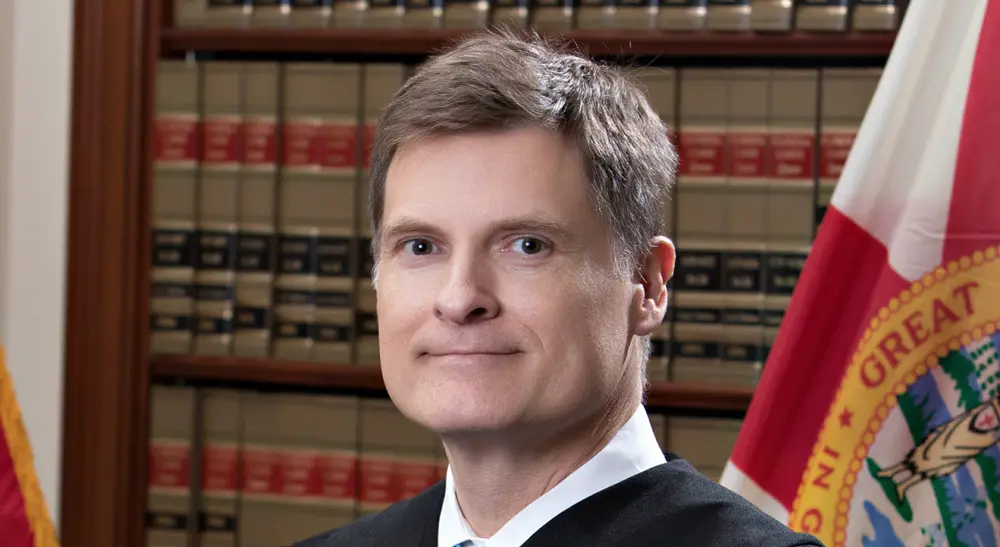
By Craig Waters
The national “fetal personhood” debate has arrived in Florida’s courts, and you can bet it won’t go away until it is resolved one way or another.
That became clear at recent arguments before the Florida Supreme Court on a citizens’ proposal to add broad abortion rights to the state constitution if voters approve them in November’s elections. Polls suggest Floridians support the proposal by large margins.
Currently, only the courts can block that proposal from the ballot after it gained nearly a million valid signatures. The proposal would add the core principles of Roe v. Wade to Florida law after the U.S. Supreme Court reversed Roe two years ago. The reversal erased a ruling that fetuses constitutionally are not “persons” and left a void in its place.
At the recent arguments, Florida’s Chief Justice Carlos Muñiz repeatedly commented on whether a fetus is legally a person under existing state law. Muñiz is one of five justices added to the court by anti-abortion Gov. Ron DeSantis, creating a majority that now controls the seven-member court.
“It kind of assumes,” Muñiz said of the ballot initiative, “that the constitution as it exists right now is silent as to any rights of the unborn. And I don’t know if that assumption is correct.”
![]() The national fetal personhood movement, often promoted by fundamentalist Christian groups, has become more active since Roe was overturned, and has had limited successes in a few states.
The national fetal personhood movement, often promoted by fundamentalist Christian groups, has become more active since Roe was overturned, and has had limited successes in a few states.
For example, Alabama’s Supreme Court recently declared frozen human embryos to be persons under that state’s Wrongful Death of a Minor Act. Some states have partly relied on the idea to prosecute drug-addicted pregnant women for delivering drugs to their unborn children.
If fetuses have legal personhood, abortion-rights activists argue it would infringe the rights of pregnant women and have serious implications for medical procedures like in vitro fertilization and the treatment of ectopic pregnancies and miscarriages.
For all practical matters, the Florida Constitution is silent on the issue of fetal personhood, despite Chief Justice Muniz’s suggestion that fetal personhood rights might already exist.
None of the other six justices at the recent arguments joined Muñiz in commenting on the issue, but there has been a rising level of public debate on the issue outside the courts. Florida’s legislature has even made moves toward taking a stand on it, however tentative.
For example, there is a bill pending in the 2024 Legislature that would allow wrongful death lawsuits in some instances for the death of “an unborn child.” Democrats and reproductive rights groups argue the bill is a back-door way to establish fetal personhood in the law. “If you’re going to create personhood, then be obvious and say ‘this is what we are doing in Florida,’ ” said state Sen. Lori Berman (D-Boynton Beach).
Muñiz himself pointed to a section of the state constitution guaranteeing all persons the right to enjoy and defend life and liberty. He also touched on other concepts supporting the idea. Criminal law, he noted, already recognizes a special status for fetuses by penalizing some types of injuries to them.
The chief justice made these comments even as he and others concluded it was not an issue they can address until future legal cases arise. The lawyer for Florida Attorney General Ashley Moody, when pressed by Muñiz, took no position on the issue but agreed it has “potential.”
There also have been proposals, none successful, to explicitly add fetal personhood to the Florida Constitution. At least one Florida court has denied a personhood claim in a habeas corpus case filed on behalf of a fetus whose mother was held in jail.
However, the argument explored by Muñiz was whether those rights already implicitly exist in the state constitution. No Florida court to date has said they do.
If such rights were recognized based on existing constitutional language, they theoretically could retroactively change the legal issues surrounding the proposed abortion amendment.
In September 2000, the Florida Supreme Court voided an amendment to strengthen the death penalty based on a somewhat similar argument. It did so even though two years had passed since 73 percent of the November 1998 voters approved the amendment.
Justices at that time reasoned that the amendment failed to tell voters it diminished existing constitutional rights of death-row inmates. Unlike the present case, however, those rights already had been clearly recognized under Florida law.
It is uncertain whether any Florida court would reach the same result here, where broad personhood rights currently are not part of clearly established law.
![]()
Craig Waters, a member of the FLCGA Board of Trustees, is a lawyer who retired two years ago after a 35-year career with Florida’s state courts. The views expressed here are his own.









